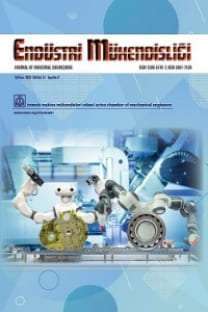ÇOK TİPLİ HASTALAR İÇİN TERCİHLERİ BAZ ALAN BİR RANDEVU ÇİZELGELEME PROBLEMİ
Bu makale, bir sağlık tesisindeki bir doktor ya da tanı cihazının randevu planlama mekanizmasına odaklanmaktadır. Bu tesisi, getirileri birbirinden farklı olan birden çok hasta tipi kullanmaktadır. Tesis, her hasta tipinden gelen randevu isteklerini her günün başında gözlemlemektedir. Müsait randevu saatlerini bu randevu isteklerine nasıl tahsis edeceğine karar vermektedir. Hastalar belli bir olasılıkla rezervasyon dönemindeki bir günü tercih etmektedirler ve sadece bir tercihleri vardır. Hastalara ya tercih ettiği güne bir randevu verilmektedir ya da randevu istekleri reddedilmektedir. Tesis, getirilerini maksimize ederken reddedilme maliyetlerini belli bir seviyede tutmak istemektedir. Bu süreç, sonsuz zamanlı beklenen indirgenmiş karı maksimize etmek için ayrık zamanlı ve kısıtlı Markov Karar Süreci ile modellenmektedir. Kısıt, sonsuz zamanlı beklenen indirgenmiş reddedilme maliyetlerinin belli bir eşik değerinin altında olmasını garanti etmektedir. En iyi politikanın rassallaştırılmış bir rezervasyon limiti politikasının olduğunu gösterdik. Modeli çözmek için iyi bilinen bir “Yaklaşık Dinamik Programlama” metodu olan “Geçici Farklarla Öğrenme Algoritmasını” uyguladık. “Yaklaşık Dinamik Programlama” sonuçlarını diğer buluşsal yöntemlerle sayısal olarak karşılaştırdık.
A PREFERENCE-BASED APPOINTMENT SCHEDULING PROBLEM WITH MULTIPLE PATIENT TYPES
This paper focuses on the appointment scheduling mechanism of a physician or a diagnosticresource in a healthcare facility. Multiple patient types with different revenues use thefacility. The facility observes the number of appointment requests arriving from each patienttype at the beginning of each day. It decides on how to allocate available appointment slotsto these appointment requests. Patients prefer a day in the booking horizon with a specificprobability and they have only one preference. Patients are either given an appointment fortheir preferred days or their appointment requests are rejected. The facility wants to keepthe rejection costs at a certain level, while maximizing its revenues. This process is modeledwith a discrete time and constrained Markov Decision Process to maximize the infinitehorizonexpected discounted revenue. The constraint guarantees that the infinite-horizonexpected discounted rejection cost is below a specific threshold. We have proved that theoptimal policy is a randomized booking limit policy. To solve the model, we have implementedTemporal Difference (TD) Learning Algorithm, which is a well-known Approximate DynamicProgramming (ADP) method. We have compared the ADP results with other heuristicsnumerically.
___
- Ahmadi-Javid, A., Jalali, Z., & Klassen, K. J. (2017). Outpatient appointment systems in healthcare: A review of optimization studies. European Journal of Operational Research, 258(1), 3–34. Doi : https://dx.doi.org/10.1016/j.ejor.2016.06.064
- Bowser, D. M., Utz, S., Glick, D., & Harmon, R. (2010). A systematic review of the relationship of diabetes mellitus, depression, and missed appointments in a low-income uninsured population. Archives of psychiatric nursing, 24(5), 317–329. Doi : https://doi.org/10.1016/j.apnu.2009.12.004
- Cayirli, T., & Veral, E. (2003). Outpatient scheduling in health care: A review of literature. Production and operations management, 12(4), 519–549. Doi : https://doi.org/10.1111/j.1937-5956.2003.tb00218.x
- Feldman, J., Liu, N., Topaloglu, H., & Ziya, S. (2014). Appointment scheduling under patient preference and no-show behavior. Operations Research, 62(4), 794 – 811. Doi : https://doi.org/10.1287/opre.2014.1286
- Gocgun, Y., & Puterman, M. L. (2014). Dynamic scheduling with due dates and time windows: an application to chemotherapy patient appointment booking. Health care management science, 17(1), 60–76. Doi : https://doi.org/10.1007/s10729-013-9253-z
- Gupta, D., & Denton, B. (2008). Appointment scheduling in health care: Challenges and opportunities. IIE transactions, 40(9), 800–819. Doi : https://doi.org/10.1080/07408170802165880
- Gupta, D., & Wang, L. (2008). Revenue management for a primary-care clinic in the presence of patient choice. Operations Research, 56(3), 576– 592. Doi : https://doi.org/10.1287/opre.1080.0542
- Magerlein, J. M., & Martin, J. B. (1978). Surgical demand scheduling: a review. Health services research, 13(4), 418. Retrieved from https://www.ncbi.nlm.nih.gov/pmc/articles/PMC107 2083/pdf/hsresearch00545-0074.pdf
- Parizi, M. S., & Ghate, A. (2016). Multi-class, multiresource advance scheduling with no-shows, cancellations and overbooking. Computers and Operations Research, 67, 90–101. Doi : https://doi.org/10.1016/j.cor.2015.09.004
- Patrick, J., Puterman, M. L., & Queyranne, M. (2008). Dynamic multipriority patient scheduling for a diagnostic resource. Operations research, 56(6), 1507– 1525. Doi : https://doi.org/10.1287/opre.1080.0590
- Powell, W. B. (2011). Approximate dynamic programming: Solving the curses of dimensionality. New Jersey, USA: John Wiley and Sons.
- Puterman, M. (1994). Markov decision processes. New Jersey, USA: John Wiley and Sons.
- Saure, A., Patrick, J., Tyldesley, S., & Puterman, M. L. (2012). Dynamic multi-appointment patient scheduling for radiation therapy. European Journal of Operational Research, 223(2), 573–584. Doi : https://doi.org/10.1016/j.ejor.2012.06.046
- Sennott, L. I. (1991). Constrained discounted markov decision chains. Probability in the Engineering and Informational Sciences, 5(4), 463–475. Doi : https://doi.org/10.1017/S0269964800002230
- Sugiyama, M. (2015). Statistical reinforcement learning: modern machine learning approaches. Florida, USA: CRC Press.
- Sutton, R. S., & Barto, A. G. (2011). Reinforcement learning: An introduction. Cambridge, USA: MIT Press Truong, V.-A. (2015). Optimal advance scheduling. Management Science, 61(7), 1584–1597. Doi : https://doi.org/10.1287/mnsc.2014.2067
- Wang, J., & Fung, R. Y. (2015). Dynamic appointment scheduling with patient preferences and choices. Industrial Management and Data Systems, 115(4), 700– 717. Doi : https://doi.org/10.1108/IMDS-12- 2014-0372
- Wang, W.Y., & Gupta, D. (2011). Adaptive appointment systems with patient preferences. Manufacturing and Service Operations Management, 13(3), 373–389. Doi : https://doi.org/10.1287/msom.1110.0332
- ISSN: 1300-3410
- Yayın Aralığı: Yılda 3 Sayı
- Başlangıç: 1989
- Yayıncı: TMMOB MAKİNA MÜHENDİSLERİ ODASI
Sayıdaki Diğer Makaleler
Metehan ATAY, Yunus EROĞLU, Serap ULUSAM SEÇKİNER
ÇOK TİPLİ HASTALAR İÇİN TERCİHLERİ BAZ ALAN BİR RANDEVU ÇİZELGELEME PROBLEMİ
Mujgan SAGİR, Nor Hayati Abdul HAMID, Graham KENDALL
A PREFERENCE-BASED APPOINTMENT SCHEDULING PROBLEM WITH MULTIPLE PATIENT TYPES
AGV SAYISINA VE HATLARDAKİ STOK MİKTARLARINA KARAR VEREN BİR HAT BESLEME SİSTEMİ KURULMASI
Zeynep GÜRGEN, H. Cihan OTACIOĞLU, H. Ozan KURT
PROMETHEE’NİN KARAR VERİCİNİN SEÇİM DAVRANIŞINI YANSITACAK ŞEKİLDE GENİŞLETİLMESİ İÇİN BİR YAKLAŞIM
